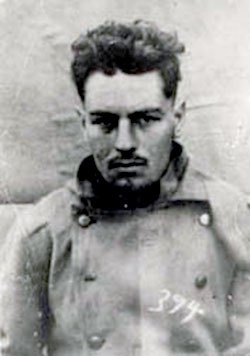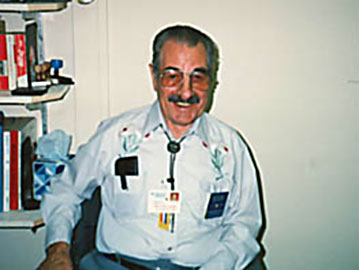
Established April 14, 1942
 |
American Ex-Prisoners of War
A not-for-profit, Congressionally-chartered veterans’ service organization advocating for former prisoners of war and their families.
Established April 14, 1942 |


Niigata, Japan, 1943
|

Raymond Pelkey, December 1995
|
|
| Last Name | First Name, Middle Init. | Nickname |
| Street Add. | City | State |
| Zip | Spouse | |
| Conflict | Branch of Service | Unit: |
| Theatre of Operation | Military Job | Where Captured |
| Date Captured | Time Interned | Camps |
| Date Liberated | Medals Received | Age at Capture |
| After the War ... | ||
Following are his personal recollections of his capture and internment as a POW.
"My captivity began with the surrendered of Bataan on April 9, 1942. At the time I was in Hospital #1 on Bataan recovering from a machine gun wound I received while on reconnaissance patrol eleven days before.
"After a short period of time the patients were all sent to the Old Bilibid Prison in Manila, which had been made into a makeshift hospital. After I recuperated I was sent to Camp #1 at Cabanatuan in the Philippine Islands where I slaved on the prison farm detail, the canal digging detail, and the digging of a Caribao Wallow. A Carabao is an Asian water buffalo. The Caribao was a source of meat for the guards; nada for the POWs.
"In September 1942 I and 349 other POW's were shipped like cattle in a Hell Ship to Niigata, Japan for more slave labor. In Camp 5-b in Niigata, I slaved in the Rinko Coal Yards. Coal was shipped from Manchuria, China to Niigata. The coal where it was unloaded from the ship to barges. From the barge the coal was elevated via a conveyer machine to a 30-foot high railroad trestle. V-shaped cars holding about one-half ton of coal each would be filled and then pushed around the track by a POW to a storage site or to railroad cars under the trestle, where it was dumped.
Once dumped the empty elevated car would circle around the track for another load. This process went on in rain, snow, high winds, or burning sun, 12 hours a day, 7 days a week. There was one very short break at mid-day for our rice and watery soup banquet.
"Our guards were a group known at Camp 5-b as on the Rinko detail. These guards were all discharged and disabled military whose methods of discipline towards POWs were measured out in proportion to the seriousness of their disabilities—caused by our military—and the disciplinary procedures they experienced in the Japanese military, which was brutal.
"Food: Our food rations added up to a caloric intake barely sufficient enough to sustain life. Breakfast was called Lugao, rice cooked in water to a constancy of oatmeal. Mid-day and evening meals were steamed rice and watery soup. One bucket of water and one Daikon, a Japanese radish, seemed to be the recipe for POW soup.
"Medical: We had no doctor In Camp 5-B until October 1943. And with no medications the doctor's only medicine was admitting as many POWs daily as our captors would allow to the doctor's tiny one-room hospital for a three-day rest. This saved many lives."
Raymond returned to New Hampshire when the war ended. He and his wife Trinidad raised seven children: three sons and two daughters. Raymond served as police officer in Hudson, and he held numerous memberships in organizations throughout the community. He was a Head Stewart at the American Legion, Post 48 in Hudson, N.H., for twenty years, was involved with the American Ex Prisoners of War, the Veterans of Foreign Wars, #5791 in Hudson, the Military Order of the Purple Heart, and the American Defenders of Bataan and Corregidor.
Raymond was also active in the Knights of Columbus in Hudson and was a 4th Degree Knight of Columbus with the Prince of Peace Assembly in Nashua.